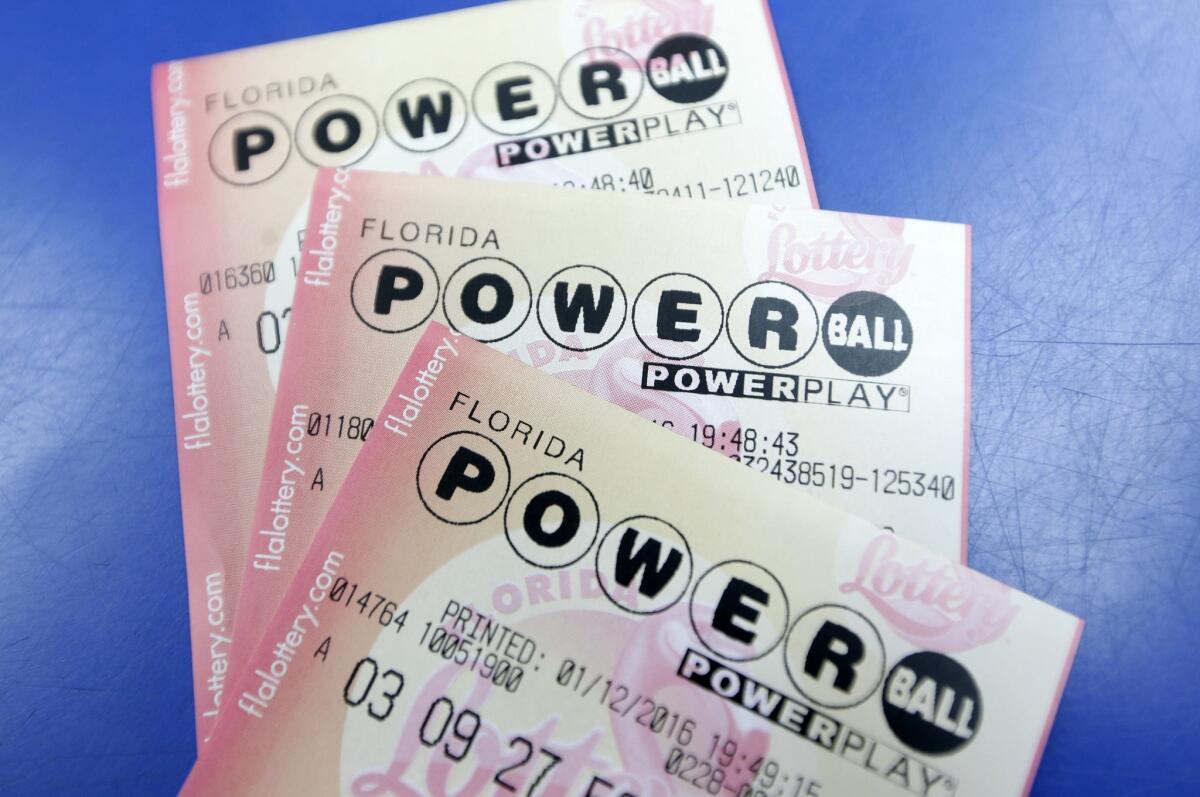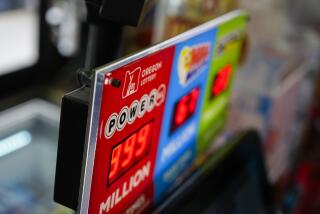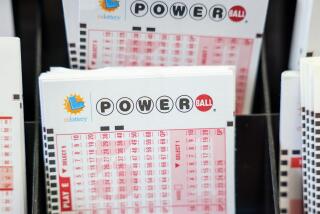Jackpot fatigue: When $300 million just isn’t worth the trouble of buying a lottery ticket

Powerball lottery tickets purchased in Miami.
Powerball had a problem last year: People were bored by the idea of winning hundreds of millions of dollars.
You could see it in New Jersey, where in September 2013, a $317-million Powerball jackpot brought a frenzy of $6.4 million in sales — about four or five times above average.
But when another $317-million Powerball jackpot came around in February 2015, New Jersey sold only $4.8 million in tickets — a 25% plunge for the same-sized jackpot.
Around the country, jackpot fatigue had set in, and now — with the Powerball jackpot crashing through barriers — it could become a problem again.
On Wednesday, Powerball officials will hold a drawing for an unheard-of $1.5-billion jackpot that has once again sent buyers lining up at markets, liquor stores and gas stations. Most Americans know they will have little chance of winning.
But what players probably don’t know was that lottery officials made Powerball harder to win last fall in order to drive up ever-more-spectacular jackpots, shore up state revenue, and save Powerball itself.
As a result, lottery officials will have to deal with a record-shattering, era-defining jackpot of their own making — one that has some observers worrying whether the bar has now been set too high.
“My suspicion is that no one anticipated the Powerball rule changes would generate this big of a jackpot this soon, and I wouldn’t be surprised if there were some buyer’s remorse out there,” said Andrew Sidamon-Eristoff, who stepped down as New Jersey’s state treasurer last year.
He now wonders whether the public will expect ever-bigger jackpots in excess of $1 billion. “Where does it end?” Sidamon-Eristoff said.
Lottery board minutes and budget testimony from several U.S. states last year showed that while “instant” lottery games — like scratch tickets — were performing well, state officials were concerned that Powerball sales for the 2015 fiscal year had dropped almost 20% nationally.
“Not long ago, that threshold to draw the interest of casual consumers who do not traditionally play the lottery was [a jackpot of] $100 million,” Massachusetts state Treasurer Deborah B. Goldberg testified in January 2015, noting that while state lottery sales were up in Massachusetts, Powerball and Mega Millions sales were down.
But with national jackpots reaching $500 million to $600 million in recent years, it now took a jackpot of $300 million to $400 million to get casual buyers interested, Goldberg said in her testimony. She concluded of Powerball, “It is becoming increasingly difficult to grow jackpots and game sales.”
One national lottery official told state policymakers “the dilemma the industry faces is once a big jackpot is hit, there is no more excitement and the media loses interest,” according to minutes from a January 2015 meeting of Committee on Lotteries of the National Council of Legislators from Gaming States.
“Small jackpots don’t keep the attention of the media, and the outcome is less excitement and attention to the game.”
Lottery officials often have to tweak the rules to freshen up their products to keep them interesting, and the Multi-State Lottery Assn., a collective of lottery states that administers Powerball, responded with a rule change that went in effect in October.
Players now choose five “white” ball numbers from a set of 69 — up from 59 — and now choose a “red” Powerball number from a set of 26, down from 35.
The odds of winning a small prize got easier, but the odds of winning the jackpot jumped from 1 in 175 million to 1 in 292 million. As a result, no one has won the big prize since November, resulting in the current mega-jackpot.
Gary Grief, the Multi-State Lottery Assn.’s Powerball chairman and the executive director of the Texas Lottery, did not respond to messages seeking comment.
“It’s had exactly opposite the effect you’d expect. It’s increased sales dramatically,” George Loewenstein, professor of economics and psychology at Carnegie Mellon University, said of the longer odds.
But Loewenstein called $1 billion “the new magic number,” adding that when he was a child, it was considered special to be a millionaire. “Nowadays, being a billionaire is equivalent to being a millionaire years ago.”
State lottery and budget officials are singing hosannas this month about how much revenue the enormous Powerball jackpot will bring in, while acknowledging that jackpot fatigue is an issue.
“People see $40 million, and they don’t get excited about that anymore,” said Colorado Lottery spokeswoman Kelly Tabor. But she also said that because of the jackpot frenzy, the state had done $41.2 million in Powerball sales in the two months since November, compared with $72 million for the entire 2015 fiscal year.
“We’re just so excited,” said Tabor, who noted that Colorado’s lottery proceeds go to parks, conservation and other outdoor efforts. “It’s also getting kind of unbelievable.”
Elias Dominguez, spokesman for the California Lottery, said lottery officials typically offset the problem of lottery fatigue by introducing other games, adding that jackpot fatigue usually lasts “only a little bit.”
“That’s totally something you think about: After this, what’s next? What’s going to get people excited? Are they not going to get excited until it hits $1 billion again?” she said.
But, Dominguez said, “people will forget about this one, and maybe in a year,” with another enormous jackpot, “we expect sales will be the same and excitement will be the same.”
Twitter: @MattDPearce
MORE ON POWERBALL
Here’s $100. Can you win $1.5 billion at Powerball?
Powerball jackpot still rising, reaches $1.5 billion
How the Powerball rules were tweaked to make the game an even bigger ripoff
More to Read
Start your day right
Sign up for Essential California for news, features and recommendations from the L.A. Times and beyond in your inbox six days a week.
You may occasionally receive promotional content from the Los Angeles Times.







